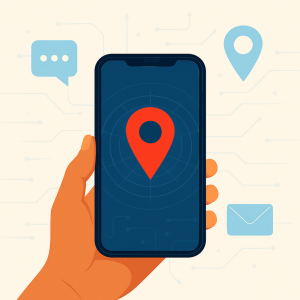 Most small business owners assume that as long as their computers are locked down, they’re protected. But in today’s mobile-first world, that assumption is dead wrong.
Most small business owners assume that as long as their computers are locked down, they’re protected. But in today’s mobile-first world, that assumption is dead wrong.
If you run a business, your smartphone is a treasure trove of sensitive information—emails, passwords, payment apps, customer data, and cloud access. And here’s the uncomfortable truth: your phone can be tracked without your knowledge. Worse yet, it’s not difficult. Most tracking techniques require no advanced skill—just cheap software and a little motivation.
That’s why mobile device security for small businesses is no longer optional. It’s a business continuity issue.
Real Threats, Not Paranoia
Let’s skip the fear-mongering and focus on facts: phones are being tracked every day by jealous partners, disgruntled ex-employees, corporate spies, and opportunistic cybercriminals. The barrier to entry? Pathetically low.
A simple Google search for “phone monitoring software” reveals dozens of apps marketed as “parental controls” or “employee monitoring tools.” Many cost less than dinner at a chain restaurant, install in minutes, and operate invisibly.
For small business owners, that means a stolen phone or even brief access by the wrong person can lead to massive exposure.
Common Phone Tracking Methods
Here’s how attackers typically get in:
-
Spyware Apps
Installed directly on the device, these apps record everything—texts, call logs, browsing history, app usage, even live mic and camera feeds. -
Phishing Links
Disguised as harmless messages, phishing links can install malware silently in the background. Many people click without a second thought. -
Over-Permissioned Apps
Some apps require access to GPS, contacts, microphone, and storage—and many users just tap “Allow” without considering the implications. -
Stalkerware
This category of spyware is built to avoid detection and is often cloaked as legitimate apps. Some don’t even appear on the home screen.
These tools don’t require hacking skills or insider knowledge. They’re marketed legally in many countries and are often used maliciously under the radar.
Why Business Owners Should Worry
Most smartphones used in a business context are loaded with highly sensitive information:
-
Client emails and contracts
-
Cloud storage access (Google Drive, OneDrive, Dropbox)
-
Password managers and saved credentials
-
Mobile banking apps
-
Access to team communication platforms like Slack or Teams
All of that can be exploited if a phone is compromised.
And it’s not just a theory. According to the Verizon Data Breach Investigations Report, the average data breach for a small business now costs $120,000—and that number is rising. Most businesses never recover from that kind of financial and reputational hit.
Red Flags: Is Your Phone Being Tracked?
Most tracking software is built to be stealthy. But there are some warning signs:
-
Sudden battery drain that doesn’t match your usage
-
The phone gets warm even when idle
-
Unusual background data usage
-
Strange behavior during phone calls (echo, static, background clicking)
-
Sluggish performance or frequent crashes
-
Apps appearing that you didn’t install
-
Pop-ups or browser redirects
One of these symptoms might be benign. But several? That’s a red flag.
What To Do If You Suspect You’re Being Tracked
-
Run a Mobile Security Scan
Install a reputable mobile antivirus/security app (like Lookout, Malwarebytes, or Bitdefender) and do a full scan. -
Review App Permissions
Audit your app permissions and remove access to anything that doesn’t need your location, microphone, or camera. Be ruthless. -
Update Your Operating System
Updates often patch vulnerabilities used by tracking software. If you’re not up to date, you’re an easy target. -
Change All Passwords
If you suspect compromise, update your passwords immediately using a secure password manager. -
Factory Reset (If Necessary)
If malware or spyware can’t be removed, perform a full reset. Back up only essential, clean data. Then start fresh. -
Lock Down Access
Enable biometric login (Face ID or fingerprint) and turn on multifactor authentication (MFA) for all work-related apps and accounts.
Think Bigger: Securing Your Entire Mobile Environment
Mobile device security for small businesses doesn’t stop at your phone. What about your employees? If your team uses personal phones to access company data—email, cloud systems, Slack, customer records—you’re exposed across every single device.
Here’s what a solid mobile security policy should include:
-
Enforced MFA for all apps
-
Mobile Device Management (MDM) for company-issued phones
-
App usage policies to prevent shadow IT risks
-
Training staff on mobile threats like phishing, spoofing, and rogue app installs
-
Zero-trust configurations where mobile access is limited by role, location, or device type
Still ignoring mobile device security? That’s like locking your front door while leaving the windows wide open.
Don’t Wait Until You’re Compromised
It’s easy to assume mobile threats only happen to “big companies.” But that’s exactly what cybercriminals count on. Small businesses are now prime targets because they often lack the time, budget, or expertise to secure their mobile environments.
That’s where we come in.
At Iler Networking & Computing, we specialize in helping small businesses protect their data—across desktops, servers, and yes, smartphones. Our comprehensive Network Risk Assessment identifies weak points in your devices and systems and gives you a roadmap to tighten things up.
Schedule your FREE Network Risk Assessment today and start securing your mobile perimeter before it becomes a liability.
Want to learn more about how we help small businesses stay secure and compliant? Read how we protect data from cyberattacks with practical, industry-specific IT solutions.






